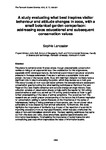A study evaluating what best inspires visitor behaviour and attitude changes in zoos, with a small botanical garden comparison: addressing zoos' educational and subsequent conservation values
| dc.contributor.author | Lancaster, S. | |
| dc.date.accessioned | 2019-05-15T15:52:30Z | |
| dc.date.available | 2019-05-15T15:52:30Z | |
| dc.date.issued | 2013 | |
| dc.identifier.citation |
Lancaster, S. (2013) 'A study evaluating what best inspires visitor behaviour and attitude changes in zoos, with a small botanical garden comparison: addressing zoos' educational and subsequent conservation values' The Plymouth Student Scientist, 6(1), p. 289-331. | en_US |
| dc.identifier.issn | 1754-2383 | |
| dc.identifier.uri | http://hdl.handle.net/10026.1/14020 | |
| dc.description.abstract |
The planet is currently under intense stress, though unsustainable consumption carries on rising at an exponential rate. One explanation for this is ignorance, especially within developed nations. Governments and industry are under extensive pressure to increase awareness, if we are to achieve a sustainable future and prevent the loss of the natural world. Zoos with their high visitation numbers have a significant role to play in educating the public, which they declare as a main goal. This study focuses on how zoos can better achieve this educational and subsequent conservation goal by looking into what learning techniques at Dartmoor Zoo and Paignton Zoo best inspire behaviour and attitude change amongst visitors. Data collection consists of; observation sheets to help clarify the results for 100 exiting questionnaires at each zoo; as well as 110 exiting questionnaires at Eden to gain further understanding of the value of animal attractions. The outcomes from this research are an overall greater understanding of the factors that influence inspiration for conservation; adding to current literature on the importance of the sense of helplessness; feeling of being powerless or incompetent, and the emotional value achievable at zoos created by their animal collections. Furthermore, this study highlights the importance of familiarity (e.g. impact of the repetition of a symbol in improving education) more so than past literature, which has also overlooked the value of non-commercialised environments. The best learning techniques that came out from this study are: talks, close encounters, species type/enclosures and information boards/signs. Emphasising the importance of social interaction and contradicting past data which depreciates the value of information boards. | en_US |
| dc.language.iso | en | en_US |
| dc.publisher | University of Plymouth | |
| dc.rights | Attribution 3.0 United States | * |
| dc.rights.uri | http://creativecommons.org/licenses/by/3.0/us/ | * |
| dc.subject | environmental pressure | en_US |
| dc.subject | natural world | en_US |
| dc.subject | Zoos | en_US |
| dc.subject | Governments and industry | en_US |
| dc.subject | conservation goal | en_US |
| dc.subject | botanical gardens | en_US |
| dc.subject | visitor behaviour | en_US |
| dc.subject | conservation value | en_US |
| dc.title | A study evaluating what best inspires visitor behaviour and attitude changes in zoos, with a small botanical garden comparison: addressing zoos' educational and subsequent conservation values | en_US |
| dc.type | Article | |
| plymouth.issue | 1 | |
| plymouth.volume | 6 | |
| plymouth.journal | The Plymouth Student Scientist |




